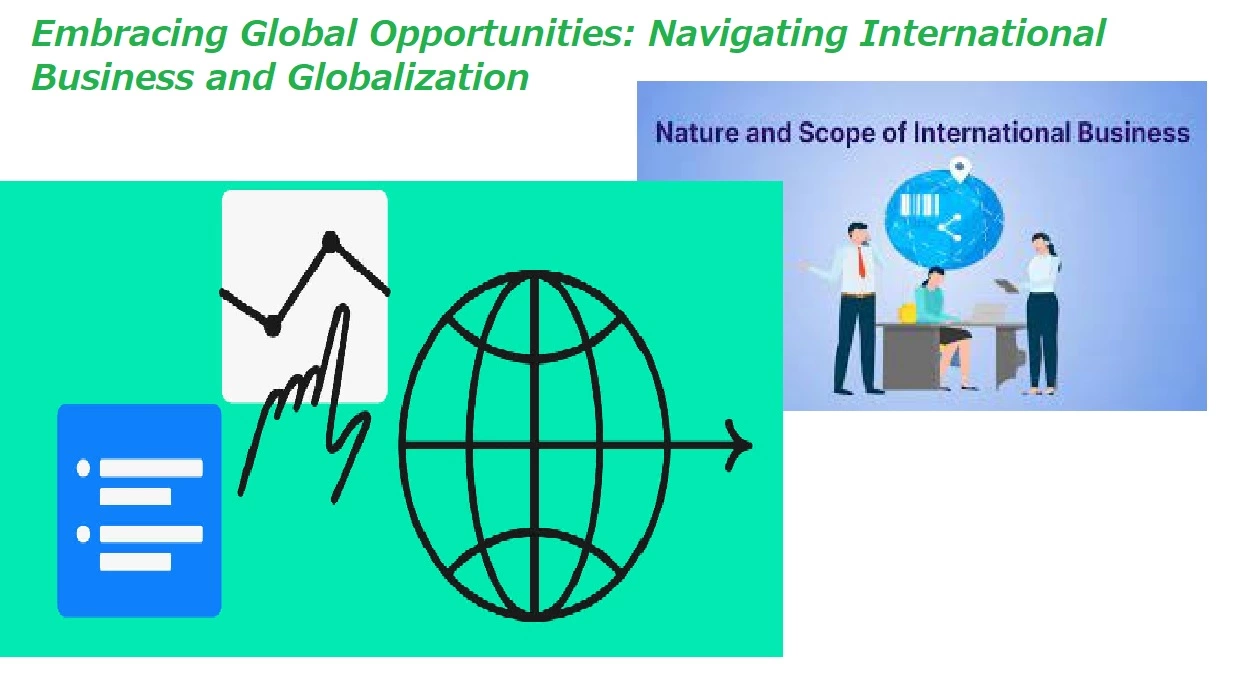
Home » Embracing Global Opportunities: Navigating International Business and Globalization

In an interconnected world, international business and globalization have become increasingly prevalent. The ability to conduct business across borders offers immense opportunities for growth, expansion, and access to new markets. However, it also presents unique challenges stemming from cultural differences, market entry strategies, and international trade dynamics. In this blog post, we will explore the intricacies of international business, uncover the challenges and opportunities it presents, and provide insights on navigating this dynamic global landscape.
Managing cultural differences is one of the main difficulties in doing business internationally. Every nation has particular traditions, conventions, and business practices that influence how business is conducted. Building successful relationships with overseas partners and clients requires an understanding of and respect for cultural variations. To bridge cultural divides, cross-cultural management entails changing communication methods, negotiating strategies, and professional conduct.
Approach: Invest time and effort in cross-cultural training and research. Foster cultural intelligence by immersing yourself in different cultures, building relationships with local stakeholders, and seeking guidance from local experts. Embrace diversity and inclusivity within your organization to promote cross-cultural understanding and collaboration.
Expanding into international markets requires careful consideration of market entry strategies. There are various approaches, such as exporting, licensing, franchising, joint ventures, and direct investment. Each strategy has its own advantages and challenges, and the choice depends on factors like market potential, regulatory environment, resource availability, and risk tolerance.
Approach: To comprehend target markets, client preferences, competitive environments, and regulatory requirements, conduct detailed market research. Work together with regional partners to benefit from their networks and knowledge. Create a thorough market entry strategy that complements your company’s goals and resources.
Globalization is fundamentally influenced by international trade, which provides access to new markets and resources. But it also requires managing intricate trade laws, tariff barriers, and logistics of supply chains. For efficient operations, prompt delivery, and low costs, global supply chains must be managed effectively.
Approach: Understand tariffs, customs laws, and international trade agreements. Work together with professionals and consultants to simplify supply chain operations and reduce risks. Adopt technological solutions for effective inventory management, supply chain visibility, and logistics.
Political and economic factors can significantly impact international business operations. Changes in government policies, trade agreements, currency fluctuations, and economic instability can pose challenges and create uncertainties. It is crucial to monitor and adapt to these factors to minimize disruptions.
Approach: Stay updated on political and economic developments in target markets. Establish contingency plans to mitigate potential risks. Diversify markets and engage in strategic partnerships to reduce dependence on specific regions or economies.
Conclusion:
Globalization and international trade present a plethora of growth and expansion prospects. Businesses can succeed in the globalized economy by recognizing and tackling the problems brought on by cultural differences, market entry techniques, and dynamics of international trade. Accept cultural diversity, make an effort to comprehend other cultures, research the market thoroughly, work with local partners, and be flexible in the face of political and economic upheaval. Businesses may effectively negotiate the challenges of doing business internationally and realize the enormous potential that comes with joining the global marketplace with careful planning, agility, and a global perspective.
Written By
Mr. Praveen
Assistant Professor
School of Commerce and Management
June 26, 2023RECENT POSTS
CATEGORIES
TAGS
Agriculture Agriculture future AI Architecture artificial intelligence Bachelor of Commerce BA English BA Psychology BTech AIML BTech CSE BTech Engineering Business management career Career-Specific Education career guide career option career scope Civil engineering commerce and management Computer Science Computer science engineering Data science degree education Engineering Engineering students English Literature english program Fashion Design Fashion design course Higher Education Journalism journalism and mass communication law Law career Machine Learning Master degree mathematics MBA MBA specialization Mechanical Engineering Pharmacy Psychology Research and Development students
University Address: Nachauli, Jasana Road, Faridabad, Haryana
For Admissions :
Toll Free: 1800-120-4613
Mobile : 8447744303 | 8447744304 | 8447744306 | 8447744309
8700003974 | 8700003411 | 8700003749
Address: C-72, Second Floor, Shivalik, Near Malviya Nagar,
Above HDFC Bank, New Delhi 110017
Landline No. - 011-46570515 / 45138169 / 41755703
Mobile No. - +91-7303152412 / +91-7303152420 / +91-9311321952
Jagmani Kutir, Ground Floor, Road No-1, Rajeev Nagar,
Near Darbar Marriage Hall, Patna-800024, Bihar
Contact No: 9818352069/ 8130120095
Mail: kanhaiya@lingayasvidyapeeth.edu.in
Copyrights © 1998 - 2025 Lingaya's Vidyapeeth (Deemed To Be University). All rights reserved.
It is important to note that the following email IDs and domains are fraudulent and do not belong to our university.
LV only conducts physical/online verification of any document related to examination on the following email id: